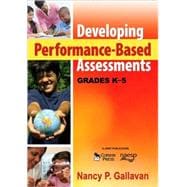
Note: Supplemental materials are not guaranteed with Rental or Used book purchases.
Purchase Benefits
What is included with this book?
| Acknowledgments | |
| About the Author | |
| Introduction | |
| Examining the Many Purposes of Assessment Demystify | |
| Performance-Based Assessments Define Performance-Based Assessments | |
| Involve Learning Options and Opportunities Incorporate | |
| Teaching Principles and Practices Meet Six Components of Assessment | |
| Know Your Learners Reflect on Your Practices Clarify Functions of Learner | |
| Achievement Picture the Continuous Flow of Assessment | |
| Start With Assessments and Objectives Differentiate Assessment | |
| From Evaluation Connect With Accountability | |
| Know the Reasons for Selecting Your Assessments? | |
| Planning Assessments to Promote Understanding | |
| Use Formal and Informal Assessments Reflect on Understanding Conduct | |
| Assessments at Multiple Times Consider All Kinds of Evidence | |
| Become a Data-Driven Teacher Balance Quantitative | |
| With Qualitative Data Itemize Criterion-Referenced Assessments | |
| Describe Norm-Referenced Assessments Justify Validity and Reliability | |
| Ensure Salience and Fairness Separate | |
| Objectivity From Subjectivity Watch Out for Errors in Assessing | |
| Visualize the Overall Process? | |
| Collecting Baseline Data for Preassessments | |
| Set Three Goals to Guide Your Preassessments | |
| Know Where to Begin the Learning Plan Where to Begin | |
| Your Teaching Establish a Foundation to Note | |
| Progress Question Each of the Six Components of Assessment | |
| Gather Baseline Data Be Aware of Your Rater Reliability Generate | |
| Preassessment Ideas Investigate the Three Spheres of Learning Keep | |
| Anecdotal Records Follow These Guidelines as You Preassess Realize | |
| That Assessment Is a Continuous Process? | |
| Aligning Appropriate Formative Assessments | |
| Consider the Six Components of Assessment Design | |
| Your Curriculum Start With the End Organize Outcomes and Coordinate Levels | |
| Align Assessments With Curriculum and Instruction Develop | |
| Your Assessments Include All Kinds of Questions Pose Powerful | |
| Questions Try Socratic Questioning Follow Strategic Guidelines | |
| Explore Cognition via Patterns of Thought Consider Sequential and Spatial Thinking | |
| Promote Deductive and Inductive Thinking Remember | |
| Divergent and Convergent Thinking Plan With Competence and Confidence? | |
| Incorporating Learning, Feedback, and Correction Assign | |
| Your Instruction and Activities Scaffold the Learning Spiral Prior | |
| Learning Compact Learning Logically Integrate Learning | |
| Across the Curriculum Offer Project-Based Learning | |
| Explore Holistic Learning Try Constructivist Learning | |
| Employ Multiple Instructional Strategies Consider | |
| These Assessment Recommendations Optimize the Feedback Refine | |
| Correction and Redirection Respond to Interventions Involve | |
| Your Learners in the Process Have Fun With Formative Assessments | |
| Administering Summative Assessments Diversify | |
| Your Summative Assessments Write Meaningful and Purposeful Assessments | |
| Prepare Learners for Summative Assessments Score Assessments | |
| Objectively Organize Projects and Presentations Feature | |
| Portfolios Understand Standardized Testing Set Your Sights on Five Essential | |
| Guidelines Strive for Academic Rigor Promote Active Learning and Assessments | |
| Ensure Authentic Outcomes Include Alternative Approaches | |
| Showcase Achievement Continue the Assessment Cycle? | |
| Identifying What to Assess | |
| Inviting the Five Types of Inquiry and Information Introducing the Five Types of Inquiry | |
| Note Immediate, Continuous, and Unending Learning Rely on Recognition and Recall Promote | |
| Logic and Reasoning Analyze Skills and Applications | |
| Demonstrate Productivity and Creativity | |
| Table of Contents provided by Publisher. All Rights Reserved. |
The New copy of this book will include any supplemental materials advertised. Please check the title of the book to determine if it should include any access cards, study guides, lab manuals, CDs, etc.
The Used, Rental and eBook copies of this book are not guaranteed to include any supplemental materials. Typically, only the book itself is included. This is true even if the title states it includes any access cards, study guides, lab manuals, CDs, etc.